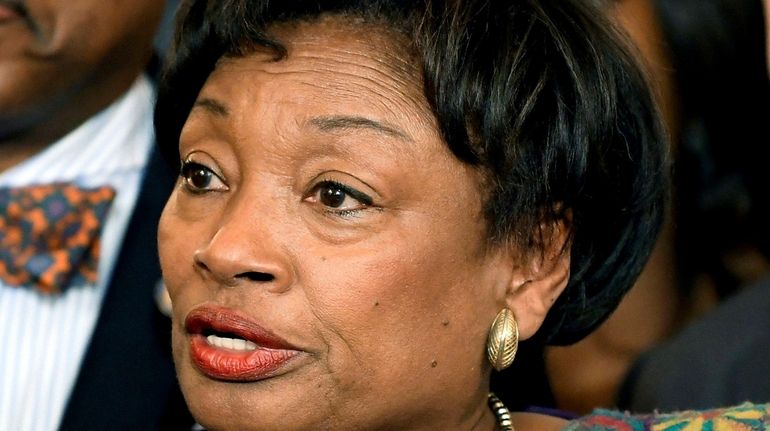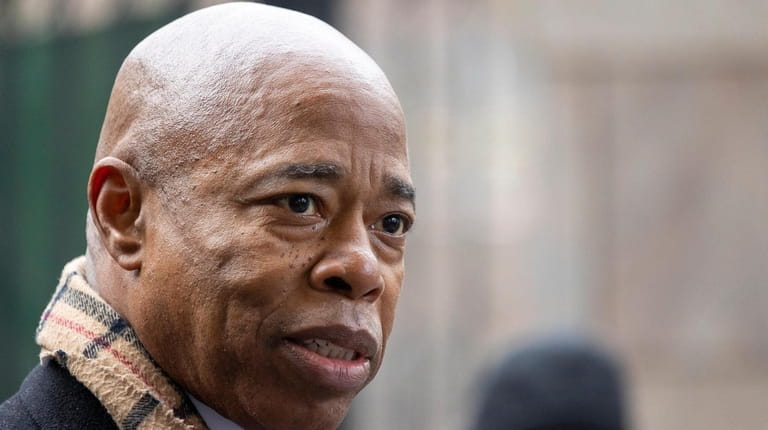For NY state actors, new roles and old strains

State Senate Majority Leader Andrea Stewart-Cousins (D-Yonkers). Credit: AP/Hans Pennink
Bitter relations between New York City mayors and New York State governors, usually of the same party, have arisen for more than half a century. Toxic flare-ups between Bill de Blasio and his former friend Andrew M. Cuomo were only the latest.
The reason is simple. State government has sweeping power over a massive five-borough government. And Nassau and Suffolk counties, and the northern suburbs, in trying to drive their own destinies, face legal restrictions and mandates out of Albany on everything from schools to taxes to public health emergencies.
That’s why counties and municipalities form associations, hire lobbyists, and prevail on local lawmakers to push agendas. This is a fact of life, baked into New York’s power dynamic.

New York City Mayor Eric Adams has a strained past with State Senate Majority Leader Andrea Stewart-Cousins (D-Yonkers). Credit: Howard Schnapp
Two-month incumbent Mayor Eric Adams and six-month incumbent Gov. Kathy Hochul had no prior history with each other, coming as they do from distant parts of the state.
But as Adams’ trip to the Capitol earlier this month showed, his strained past with the now-powerful Senate Majority Leader Andrea Stewart-Cousins (D-Yonkers), a key Hochul ally, makes for a bit of bad karma on the newly arranged landscape.
Elected after vowing to battle a disturbing spike in crime, Adams has said he wants lawmakers to amend the changes enacted in recent years that curbed setting bail for nonviolent offenses and raised the age at which someone can be charged as an adult.
Stewart-Cousins and progressive legislators, however, defend those measures as important blows against uneven justice and mass incarceration — and insist any legal changes should be based on solid crime data.
The personal element seems relevant. When Adams met with her conference Feb. 14, he was doing so as a former member. Adams was elected senator in 2006, the same class as Stewart-Cousins. And they were clearly in different power factions during Adams’ seven-year tenure.
She first rose to conference leader in December 2012 by unseating Sen. John Sampson (D-Brooklyn). Adams was a close Sampson ally, which Cousins’ loyalists haven’t forgotten.
This didn’t help Adams’ resume. When Sampson headed the conference as majority leader, Adams chaired the Racing and Wagering Committee. Both men, along with former Sen. Malcolm Smith of Queens, were found to have committed ethical lapses involving the awarding of the casino franchise for Aqueduct Racetrack in Queens.
Sampson later pleaded guilty to unrelated embezzlement charges involving his private role as a lawyer. He served federal time, and was released last August.
Prior to a blue wave four years ago, Stewart-Cousins’ ascension to majority leader was frustrated by the breakaway Independent Democratic Conference, which coalesced with Republicans.
The IDC had eight members when it was dissolved in 2018. One was ex-Sen. Jesse Hamilton, an Adams protege, who succeeded him in the 20th S.D. That, too, isn’t forgotten in the majority leader’s office.
Both elected officials have maintained diplomatic relations. Stewart-Cousins’ colleagues say that personalities aside she’s committed to governing for the good of the city as well as the suburbs. Adams gave a unity speech at the state Democratic Party convention last week, saying in part: "We do not need to choose between security and justice."
This is a different local-versus-Albany tension than, say, GOP Nassau County Executive Bruce Blakeman’s recent defiance of Hochul’s COVID-19 orders, driven by party polarization.
Both issues point up another fact of life. Personal dealings among the players, whomever they involve, forever drive policy.
Columnist Dan Janison’s opinions are his own.

